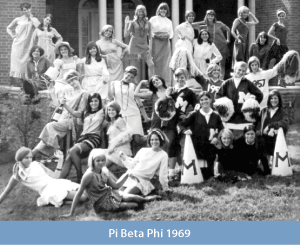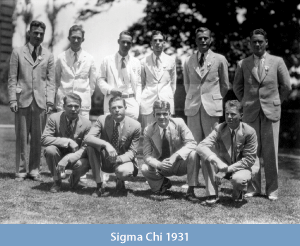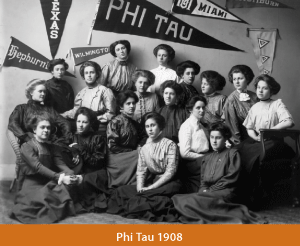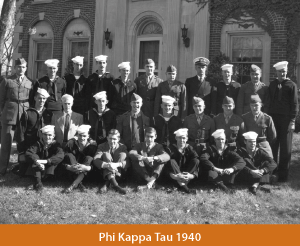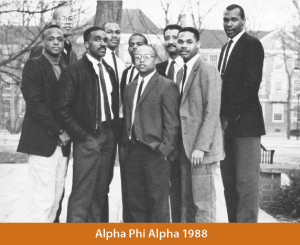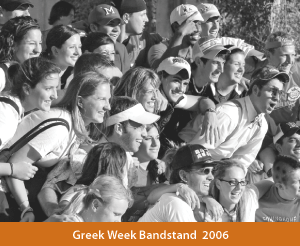 
By Andy Resnik ’97
When a local elderly couple with health problems couldn’t make necessary improvements to their home, the Alpha Chapter of Beta Theta Pi recruited 120 members throughout Miami University’s Greek system and volunteered 720 hours of service to make the needed repairs.
Calling their efforts the “Extreme Home Makeover: Greek Edition,” the participants produced more than a safe shelter for a deserving couple; they developed leadership skills and a lasting camaraderie.
“A fraternity is a place where you should build lifelong habits of service and giving back,” said Jonathan Brant ’75 MBA ’82, director of the Beta Theta Pi Foundation, which helps raise money to support educational initiatives offered by the fraternity.
While Miami offers numerous student organizations that foster intellectual and personal growth, Greek members believe their groups offer a unique experience by combining academic and social elements to teach students ideals that they will carry with them long after college.
When it comes to academics, Greeks nurture each other. The older members coach the younger ones on how to participate in the classroom and connect with faculty and their research. Fraternities and sororities also offer study halls and tutoring, with members working together to ensure success, said April Robles, director for Miami’s Cliff Alexander Office of Fraternity and Sorority Life and Leadership. The all-fraternity/sorority GPA after the fall 2007 semester was 3.11, compared to the student body’s average of 3.04.
Their leadership skills are developed through diverse service projects, following a recent national trend to focus more on community service. With nearly one-third of the university’s 14,265 undergraduates currently belonging to the 50 fraternities and sororities on campus, when they work together they definitely show a strength in their numbers.
In November the Panhellenic Association and Interfraternity Council organized a carnival for residents of Oxford’s mobile home park. During the festivities, Greek members got to know the residents and saw some needs. Soon they were creating emergency kits to hand out and holding a holiday party for children in the area, donating toys and clothing.
“One of our graduate students took on the carnival as her diversity and inclusion project because a lot of our students are stuck in the Miami bubble and didn’t even know that that community existed in Oxford,” Robles said.
“She really helped the students make a connection as to what the needs and the social justice issues are and how the Greek community can help to support those needs and better educate all our students about the true population of Oxford.” Educational programming is an important element of Greek life. Sororities frequently host meetings open to all students to discuss such topics as alcohol education, sexual assault, healthy eating, and various mental health issues.
“That’s a unique fact about the Greek community, the amount of positive programming and effort that has been dedicated to helping women feel strong and empowered,” said Erika Wirtz ’08, an Alpha Delta Pi who recently concluded a year as president of Miami’s Panhellenic Association, the sororities’ governing council.
A marketing and political science major from Wyoming, Ohio, Wirtz said social gatherings such as formals and date parties are “an important part of Greek life at Miami, but they’re not the main focus.”
The main focus is lasting friendships started at the chapter level. The Greek system also allows minority students to stay connected on a predominantly white campus, said Walter Kimbrough MS ’91, president of Philander Smith College in Little Rock, Ark.
“I always tell people at Miami I could go an entire day and not see another black person,” said Kimbrough, a member of Alpha Phi Alpha whose master’s degree is in college student personnel services. Being in a traditionally African-American fraternity, he said, “gave me an immediate connection, a sense of being, a place to belong.”
Sharrell Hassell ’00 MEd ’01 MS ’08 enjoyed a similar experience with Alpha Kappa Alpha, inspiring her to stay involved in the sorority after she graduated. She currently serves as a graduate adviser.
“The sorority just allowed so many opportunities to participate in service, sisterhood, and scholarship, which to me develops these young women as they try to navigate their way through college,” said Hassell, who just earned a second master’s degree at Miami.
One of the newest additions to Miami’s Greek community is the Pi Gamma Chapter of Sigma Lambda Gamma, a Latina-based, multicultural sorority. Students are also exploring the possibility of an Asian sorority.
Miami’s Greek system began in 1833 when Alpha Delta Phi started a local chapter. The system expanded six years later with the founding of Beta Theta Pi. Phi Delta Theta (1848), Sigma Chi (1855), Delta Zeta (1902), and Phi Kappa Tau (1906) also started at Miami. The unprecedented number of Alpha chapters founded at Miami has earned the university the nickname “Mother of Fraternities.”
“It’s definitely cool to know you are a part of something that’s much bigger than yourself, especially at Miami, with the fraternities that were founded here,” said Chris Burton ’08, a finance major from Columbus who this past December concluded a year serving as president of the university’s Interfraternity Council.
What’s not so cool are the common stereotypes of Greek organizations, perpetuated by such movies as “Animal House.” The university does not condone those activities depicted and is vigilant about enforcing its strict rules.
“Miami, as most colleges, has to deal with an alcohol culture, and I think some fraternities are very responsible in that area, and some are acting irresponsibly,” said Dick Nault, vice president for student affairs, who is retiring this summer after 25 years at Miami.
A number of chapters have been suspended in the past few years. Susan Vaughn, director of Ethics and Student Conflict Resolution, believes it is important to note that hazing and alcohol and drug abuse occur within many student organizations, and the university holds all of them accountable.
Any group with a long history is bound to have faced challenges. The key is to turn trouble into an opportunity for growth. When Beta Theta Pi was forced to close its Miami chapter from 1999 to 2001, fraternity members “were way out of balance for what it is they thought was important. Alcohol was way too important to them,” said Brant, a Beta.
Betas now follow a “Men of Principle” mission statement that calls for “intellectual excellence, high standards of moral conduct, and responsible citizenship,” according to the fraternity’s Web site.
These high standards created a nurturing environment for Cliff Alexander ’56 of Piqua, Ohio, whose $1 million donation to Miami in 2004 endowed the university’s Greek affairs office. Alexander cherishes his memories of living in the Sigma Nu house and believes that experience prepared him for his career in business.
“When you go off to college, most people aren’t really socially polished, I guess you could say. I for one was a scared kid who learned a lot about people from living with a group of guys who were truly brothers. By the time we graduated, we were really a tight knit group of fellas.”
The 175th anniversary of Greek life at Miami is sad for Alexander, whose 20-year-old grandson, Clifton Alexander, died tragically this past fall at the Sigma Nu house. Clifton was an active leader in the fraternity, just like his grandfather.
As with Clifton, it’s common for children and grandchildren to follow their family into the university’s Greek system after hearing stories about fraternity and sorority life and lasting friendships.
Burton’s mother and aunts were Pi Phi’s at Miami. Wirtz’s grandmother, a Gamma Phi Beta, and grandfather, a Pi Kappa Alpha, met at Miami.
“The main reason I wanted to go Greek was because of the positive experience my grandparents had,” Wirtz said. “That was a very big influence I had growing up.”
This year’s 175th anniversary of Greek life at Miami is an ideal time to reflect on its extensive history, highlighted throughout the Oxford campus with the Beta Bells, the Phi Delt Gates, the Delta Delta Delta Sundial, the Phi Tau Circle, and the Chi O’ Corner in front of Shriver Center.
This is also an ideal time to look to the future, a future in which Hassell believes Greek organizations should push to diversify their memberships.
“They should consider how they’re recruiting and see if they’re tapping into multiple communities,” said Hassell, a past secretary, vice president, and president of Alpha Kappa Alpha.
Nault said that Miami, as the “Mother of Fraternities,” must set the bar for Greek systems at other schools.
“We have five Alpha chapters on this campus,” he said. “That is an extraordinary history, and because of that it’s important to take a position of national leadership.”

Andy Resnik ’97 is a Columbus-based journalist.
Photos from Frank R. Snyder Collection, Miami University Libraries.
 Back to the Miamian Magazine Summer 2008 Web page Back to the Miamian Magazine Summer 2008 Web page
|


